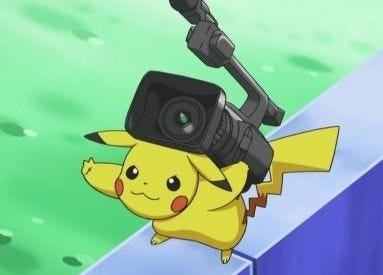Watch and Learn
Lessons from Filming Jiu Jitsu
I started to take video because I wanted to get better at jiu jitsu.
What actually happened was even better.
I got better at my relationship with jiu jitsu.
I Learned to Ask for What I Want
The first thing that I noticed was that I had to be proactive with filming, which meant that I had to communicate to my partner that I wanted to film our training. In addition, since I was working specific scenarios, I had to request that we start in a specific position and reset when necessary.
If you didn’t know this before, then you’ll know now: I am very uncomfortable with asking for help. I usually wait until the urge grows so great that it forces me to overcome my anxiety with putting my trust in other people. (It has gotten better with professional help.)
I was forced to practice asking people to help me train a specific way. Even more surprising was the fact that nobody ever said no to me. Over time, I got more comfortable asking people to train with me in a specific way, even if I wasn’t filming. I started to enjoy training more because I didn’t feel like I was a passive participant in my training.
I Started to Embrace Problem Solving
When I was younger, I had a weird bias about learning: I always felt like the best people in academics were the people who had the most amount of information available to them. For jiu jitsu, I tried the same approach by working with online mentors and buying instructionals to cram.
I experienced a paradigm shift when I voiced concern to my mentor over missing a few online sessions. I was afraid that I wouldn’t make any progress that week because I didn’t have someone telling me exactly what I did wrong and what I needed to improve.
My mentor wasn’t having any of it, because he responded quite bluntly along the lines of:
These sessions are helpful so that you don’t make the same errors repeatedly, but they are just a small part of your development. What’s really important is taking the time to think about your jiu jitsu and learn to spot the issues yourself. Also, as a black belt, I don’t have anyone telling me what I’m doing wrong — I am responsible for figuring out that myself.
This response made me reconsider my startegy of throwing dollars to improve my garbage guard or prosaic passing. I started to see an opportunity that I had missed. In filming my footage, I could learn to spot issues myself, form theories, and test them. I could still rely on more experienced people to give me the answer, but perhaps, that didn’t have to be the default option.
I Showed Improvements with Being Present
Currently, being in the present moment is a big skill that I’m working on in jiu jitsu. When I started to film myself, I noticed that I was taking myself out of the present moment. This would be almost inevitable if I needed to capture footage of a certain position. If I wasn’t getting “good” footage for some reason, I would get increasingly more anxious and less focused on the actual jiu jitsu training happening RIGHT NOW.
A simple solution would have been to stop filming.
A better solution was to develop a sense of detachment regarding outcomes. I realized that I was making myself miserable by binding myself to some random contract with the Universe to hit certain moves on certain days.
Some days, I still know that the camera is still there. (After all, I put it there.) But more often, I'm able to hit record and forget about the fact that the camera is there. I am able to focus on what I’m here for: myself, jiu jitsu, and the vibes.
